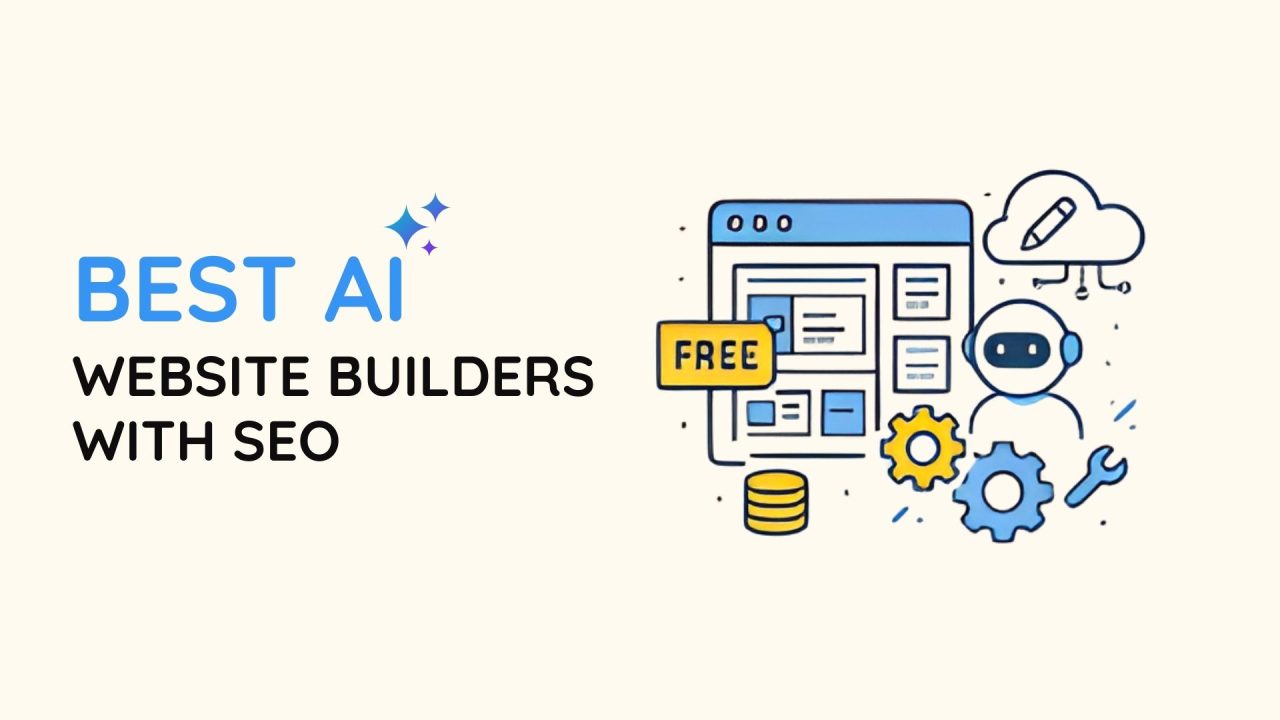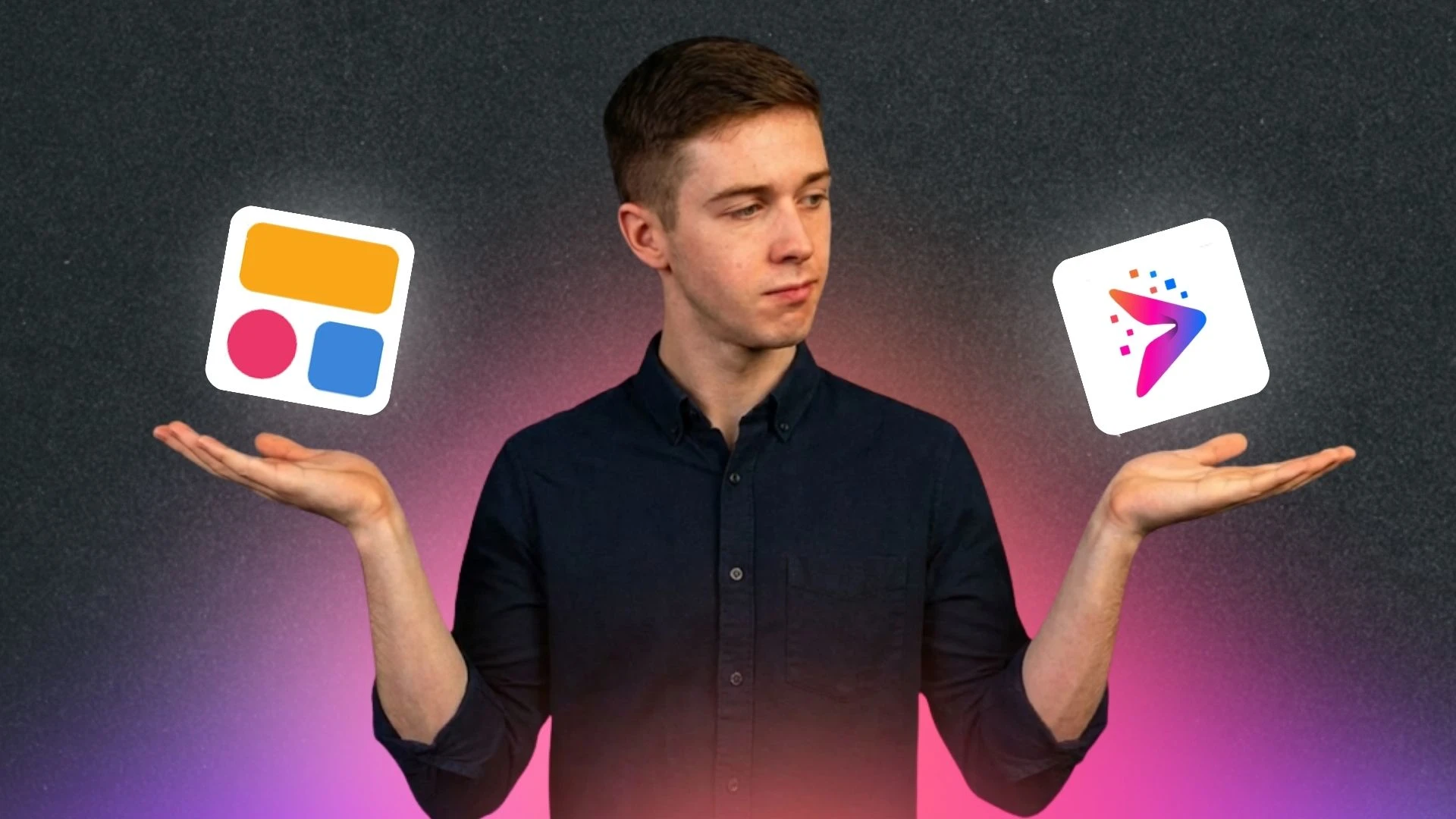Launching a high-ranking website no longer requires a massive budget or technical expertise. The best free AI website builders now combine automated design with powerful SEO features, ensuring your content reaches the right audience immediately. By selecting a platform that handles on-page optimization and mobile responsiveness for you, you can focus entirely on growth. This guide explores top free tools like Wix and imagine.bo, empowering you to build a professional, search-ready online presence without any hidden costs.
What Are AI Website Builders?
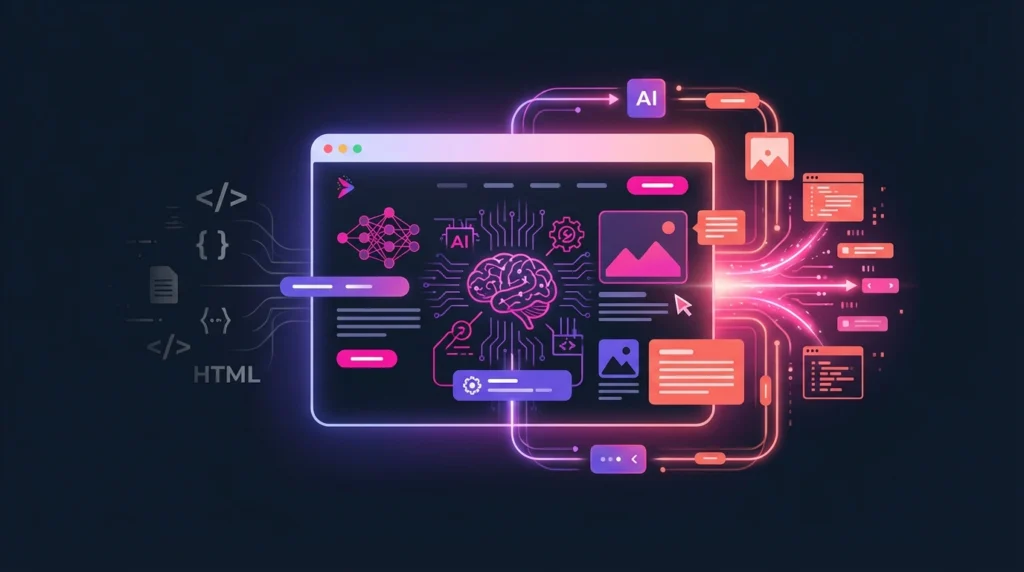
AI website builders use automated technologies to streamline site creation. They focus on generating design, content, and SEO elements with minimal human input. These tools differ in functionality from conventional builders, offering unique advantages for users seeking efficiency and optimization.
Launch Your App Today
Ready to launch? Skip the tech stress. Describe, Build, Launch in three simple steps.
BuildDefinition and Core Functionality
AI website builders are software platforms that employ artificial intelligence to automate the design and development of websites. They typically generate layouts, select color schemes, arrange content, and sometimes produce text based on user prompts or industry best practices. This automation reduces the need for manual coding or design skills.
Many AI builders also integrate SEO features like automatic meta tag creation and keyword suggestions. These elements help improve search engine rankings without requiring users to have deep SEO knowledge. AI continuously adapts the site’s structure and content to optimize visibility.
AI Versus Traditional Website Builders
Traditional website builders rely heavily on manual design and coding choices made by the user. Users select templates and drag-and-drop elements but often perform SEO and content management themselves. In contrast, AI website builders handle much of this work through machine learning models and data-driven decision making.
AI builders can analyze user goals, industry data, and SEO trends to create optimized websites faster. They tend to offer cleaner code and built-in SEO, which benefits site performance. However, traditional builders may provide more granular control for experienced users preferring customized designs.
No-Code and Low-Code Platforms
Many AI website builders fall under no-code platforms, meaning users do not need extensive programming knowledge. No-code platforms allow complete site creation via visual interfaces and AI assistance. Low-code platforms may require minimal scripting for custom features.
These options democratize website creation, making it accessible to small business owners and hobbyists. They often include AI-powered SEO tools, such as automated metadata and keyword optimization. The combination of AI and no-code interfaces drastically lowers barriers to launching an SEO-friendly website quickly.
Benefits of Using AI Website Builders for SEO

AI website builders enhance SEO efforts by streamlining key tasks and ensuring websites meet current search engine standards. They provide real-time suggestions and analytics that help maintain and improve search rankings without heavy manual input.
Automated On-Page Optimization
AI website builders automatically optimize crucial on-page SEO elements such as meta titles, descriptions, header tags, and image alt text. The AI analyzes the content and structure, adjusting these elements to align with targeted keywords and SEO best practices.
This automatic optimization reduces errors and omissions that typically occur when manually updating multiple pages. It also ensures consistency across the site, which helps search engines better understand the website’s relevance and improve its ranking potential.
SEO Analytics Integration
Many AI website builders integrate SEO analytics tools directly into the platform. This provides users with ongoing insights into site performance, keyword rankings, traffic sources, and user behavior.
With this data readily accessible, users can make informed decisions about content updates and marketing strategies. The AI may also offer improvement suggestions based on analytics trends to continuously enhance SEO outcomes over time.
Time and Cost Efficiency
Using AI website builders significantly reduces the time needed to launch a fully optimized website. The automated systems handle complex SEO tasks in minutes that might otherwise require hours of manual effort or professional services.
This saves money on hiring SEO specialists or web developers for SEO-related work. For small businesses or individuals with limited budgets and technical skills, AI builders present a practical and affordable way to maintain strong SEO without extra resources.
Key Features of the Best Free AI Website Builders with SEO
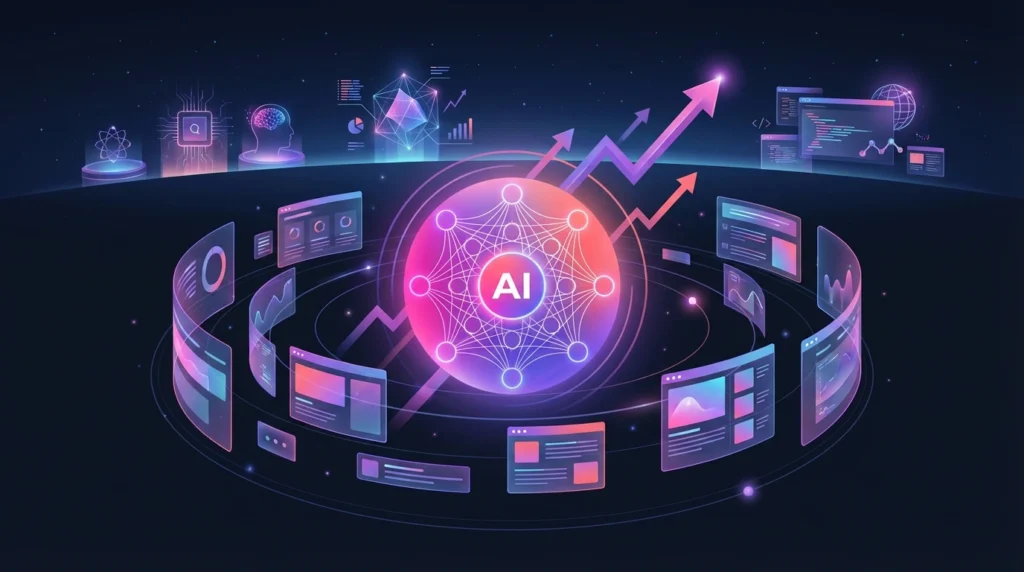
The best free AI website builders with SEO combine ease of use, seamless performance, and essential security features. They enable users to create professional sites without coding, ensure accessibility across devices, and maintain compliance with data protection standards.
Drag-And-Drop Editors
Drag-and-drop editors allow users to customize website layouts visually, eliminating the need for any coding skills. These editors provide a zero-code interface, letting users position elements like text, images, and buttons simply by dragging them.
The best AI builders also include professional-grade quality design templates that adapt based on user input. Users can tweak colors, fonts, and structures while retaining a polished, responsive look. Some editors offer AI suggestions to optimize layout and content flow automatically.
Integrated analytics dashboards often complement these editors by showing real-time data on visitor behavior, helping users adjust site elements and SEO without leaving the platform.
Mobile Responsiveness
Mobile responsiveness is critical as over half of web traffic comes from mobile devices. Top AI website builders ensure sites look and function smoothly on all screen sizes. They automatically generate mobile-friendly versions of web pages, adjusting navigation menus, images, and text for smaller displays. This reduces bounce rates and improves search engine rankings.
Built-In Security and Compliance
Security features and compliance protocols are essential for protecting user data and building trust. Leading AI website builders include built-in security checks such as encryption and automatic backups. Compliance with regulations like GDPR and SOC 2 is integrated, ensuring sites meet legal requirements for data handling and privacy.
Top Free AI Website Builders in 2025
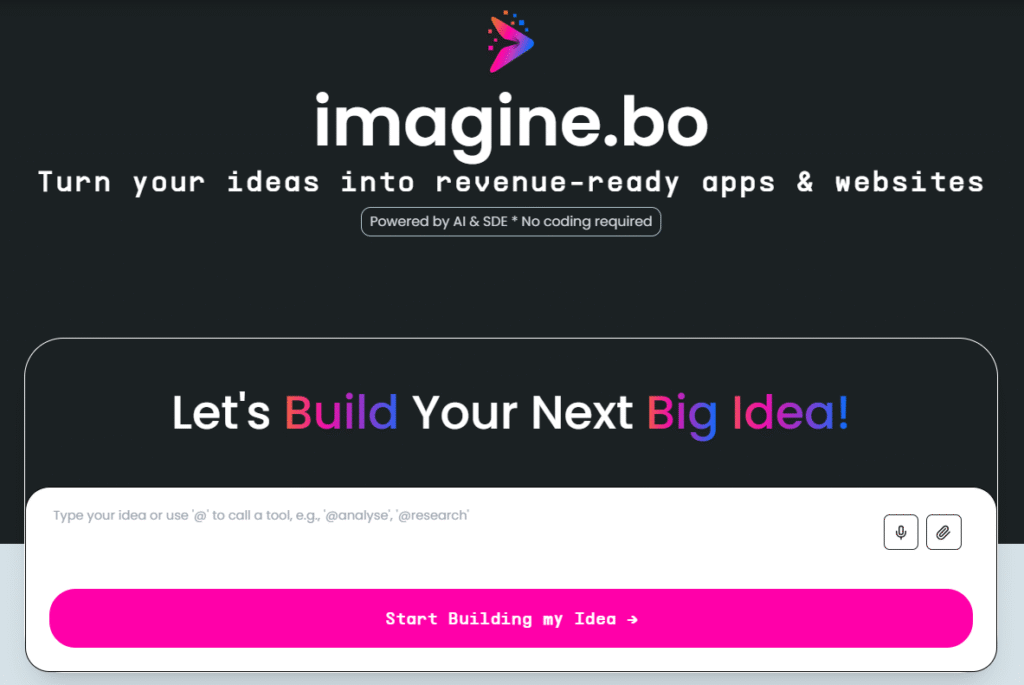
Several AI website builders offer free plans combined with SEO tools to help users create and optimize sites without upfront costs. These platforms vary in design flexibility, AI features, and support options, giving users diverse choices based on their needs.
imagine.bo
imagine.bo is a notable AI website builder currently in private beta, offering free access to early users via a waitlist. It features scalable infrastructure designed to handle growing site demands. The platform emphasizes expert support during this phase, helping users navigate AI-driven site creation efficiently.
Although still in beta, imagine.bo includes AI tools that simplify design and content generation. It focuses on improving SEO automatically, making it a strong candidate for users who want AI assistance combined with search optimization without initial fees. Access is limited until full release but remains free during the beta period.
Platform Comparisons
Several free AI website builders stand out in 2025, including Wix, Jimdo, Framer, and imagine.bo. Wix is popular for its extensive template library and built-in SEO tools. Jimdo offers affordable upgrades alongside a free plan. Framer targets designers with slick, intuitive interfaces focused on visual appeal.
| Platform | Free Plan Features | SEO Tools | Target Users | Upgrade Cost |
| imagine.bo | Private beta, scalable backend | Automated SEO | Early adopters, startups | Waitlist access |
| Wix | Drag-and-drop, 900+ templates | Built-in SEO | General users | Paid plans available |
| Jimdo | Basic site building | Basic SEO | Beginners | Affordable upgrades |
| Framer | Design focus | Limited SEO | Designers | Paid plans required |
Strengths and Limitations
imagine.bo’s beta status means users benefit from free access and expert guidance but may face feature limitations or stability issues typical of beta software. Its scalable infrastructure supports growth, but full public availability is still pending.
Wix combines ease of use with SEO control, suitable for small businesses and individuals. However, free plans include Wix branding and limited storage. Jimdo offers an entry point for novices but may lack advanced AI capabilities.
How AI Website Builders Enhance SEO Performance
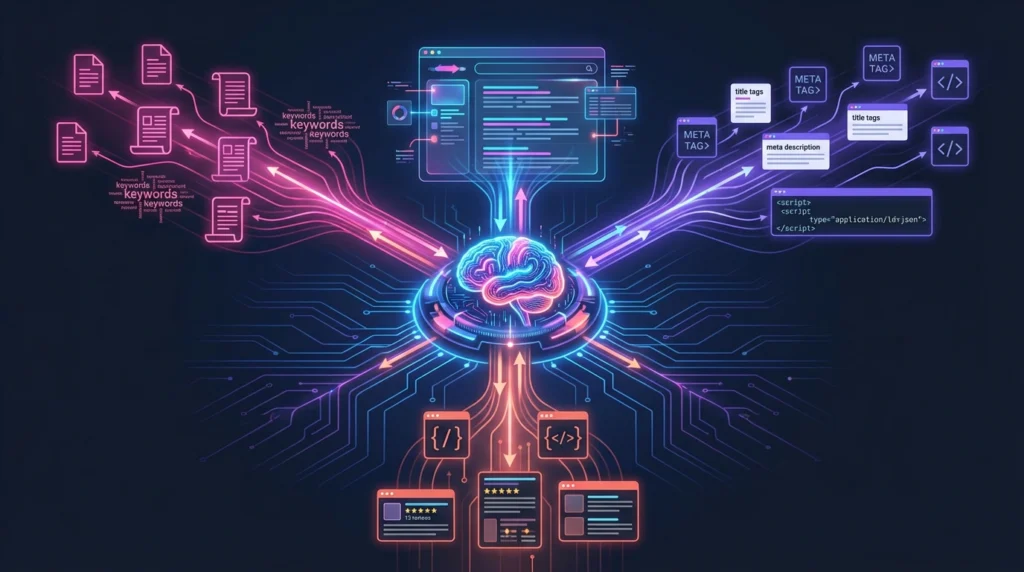
AI website builders improve various technical and content-related SEO elements automatically. They focus on content generation, metadata optimization, and structured data integration to directly impact search engine rankings and user experience.
Automated Content Creation
AI tools integrated into website builders create relevant, keyword-rich content based on user input and trending topics. This process eliminates time-consuming manual writing while ensuring the content adheres to SEO best practices.
These platforms analyze search patterns and user behavior to generate blog posts, product descriptions, and landing page text optimized for specific keywords. The AI can refresh content regularly to maintain ranking relevance.
Optimizing Metadata
Metadata—such as page titles, descriptions, and keywords—is crucial for SEO. AI website builders automatically create and optimize metadata by analyzing keyword trends and competitor data. They generate unique, descriptive titles and meta descriptions tailored to each page’s content, improving click-through rates from search results.
Structured Data Markup
Structured data markup helps search engines understand a website’s content context more clearly. AI website builders automatically add schema markup for products, events, reviews, and more. This markup enhances rich snippets in search results, making listings more informative and visually distinct.
Who Should Use a Free AI Website Builder?
Free AI website builders offer streamlined design, fast setup, and integrated SEO tools that cater to specific user needs. They serve well for individuals and organizations aiming to launch websites quickly without extensive technical skills or budgets.
Founders and Solo Makers
Founders and solo makers benefit from free AI website builders as these tools reduce the time and cost typically required for website development. They provide intuitive interfaces and AI-driven content suggestions, enabling users to create professional sites without hiring designers or developers.
Agencies and Client Projects
Agencies and client projects benefit greatly from free AI builders for rapid prototyping and delivering client websites on tight deadlines. These platforms streamline workflows by automating design and SEO optimization, allowing teams to maintain consistency across various campaigns.
Startups and MVP Development
Startups building minimum viable products (MVPs) rely on free AI website builders to create functional websites quickly and cost-effectively. These tools support fast iteration, letting startups test market assumptions with a professional web presence before investing heavily in development.
How to Get Started with Free AI Website Builders
Getting started with free AI website builders usually involves simple steps that include account creation, specifying your website needs, and using automated tools to build and launch your site quickly.
Joining Beta Programs
Many AI website builders offer beta programs that provide early access to new features. Users typically need to sign up with an email address or social login, like Google or Facebook, to join these programs. This early access enables trying innovative tools such as one-click build functions or enhanced SEO automation.
Building Your First Website
After logging in, the next step is to describe your idea through an easy-to-follow questionnaire. This includes specifying the website type, target audience, and content style. You can essentially create a free website in minutes as the AI uses this input to generate a basic site structure, complete with content suggestions and theme customization.
Scaling and Deploying Your App
Once the site is ready, users can choose deployment options suited to their needs. Popular services include Deploy to AWS, Deploy to GCP, or Deploy to Vercel, which offer scalable hosting with reliability. Most AI builders integrate with these cloud services for seamless publishing.
Limitations and Considerations
Free AI website builders offer a quick and economical way to launch a site, but users must evaluate costs, design flexibility, and available assistance. Knowing these aspects helps in planning growth and maintaining SEO effectiveness.
Transitioning from Free to Paid Plans
Most free AI website builders impose limitations such as restricted bandwidth, limited storage, and reduced SEO tools. Users typically need to upgrade to a paid plan to access better performance, advanced features, and removal of ads.
Customization Constraints
AI website builders usually offer easy-to-use templates, but customization can be limited. Editing tools tend to be basic, which restricts users who want unique layouts or advanced design features. This limitation can impact branding consistency and functionality, especially for businesses with specific requirements.
Future Outlook for AI Website Builders and SEO
AI website builders are expected to continue evolving in sophistication, integrating more advanced features that improve both site design and SEO performance. These developments will enhance user control and automate complex tasks without sacrificing quality or customization.
Advancements in AI Capabilities
AI website builders will increasingly incorporate natural language processing (NLP) to better understand user intent and generate content tailored to specific audiences. This will improve site relevance, directly impacting SEO rankings.
Predicted Trends for 2026 and Beyond
By 2026, SEO strategy predictions suggest AI builders will offer real-time SEO auditing and adaptive recommendations as sites evolve, helping businesses stay competitive without constant manual oversight. Integration with analytics platforms will enable AI to make data-driven adjustments to content and structure automatically.
Launch Your App Today
Ready to launch? Skip the tech stress. Describe, Build, Launch in three simple steps.
Build
